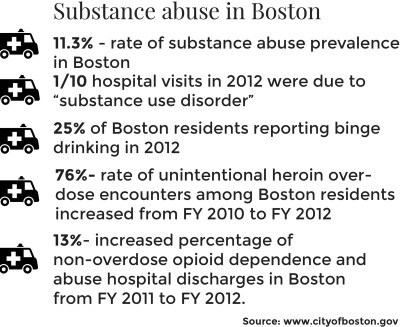
To assess the prevalence of drug abuse and addiction in the city, Boston Mayor Martin Walsh joined the Blue Cross Blue Shield of Massachusetts Foundation Wednesday to release a report that will serve as a blueprint to address the issues.
The newly established Office of Recovery Services, which will operate under the Boston Public Health Commission, will follow recommendations for short- and long-term goals for treatment and recovery, the report stated.
“We see addiction’s devastation in our homes, at our workplaces, and on our streets. Where there are accessible recovery supports that readily assist people and families suffering from addiction, devastation can quickly transform into a wellspring of resilience and strength,” Walsh said in a Wednesday press release.
The rate of substance abuse prevalence in Boston is 11.3 percent, the report stated. Alcohol and heroin have the highest abuse rate, and in 2012, 1 in 10 emergency hospital visits in Boston were a result of “substance use disorder.”
Julie Burns, a spokeswoman for the Blue Cross Blue Shield Foundation, said creating the ORS stemmed from a recommendation by the foundation.
“The most significant recommendation made was that the office should be a place where coordination can take place between city, state and private organizations, so that people can get the treatment they need,” Burns said.
Burns said one of the biggest problems Boston faces is the lack of available beds in clinics, as well as a lack of coordination between programs.
“There are two problems, one is that there are not enough beds. The other is that there is a lack of coordination between programs and services,” Burns said. “There is sometimes not communication between inpatient and outpatient programs and there are people who are falling through the cracks because of this gap.”
The substance treatment system works statewide and often treats patients who are not residents of Boston, the report stated. In the city, there are 152 recovery beds per 100,000 residents for detox, transitional support and clinical stabilization, which is a higher density compared to other areas in the state.
State and local leaders identified issues within the system including a disparity between need and access for certain populations, “a continuing lack of parity in the insurance system,” an insufficient level of training for treatment and a lack of recovery support services in Boston, the report stated.
Some of the recommendations to improve the system include adjusting bed capacity to treat residents, having “more cohesive and integrated continuum of care” to decrease relapse and spreading awareness about abuse in the community.
Jennifer Tracey, who has 20 years of experience in health and human services, will serve as director of the ORS.
“I am grateful to bring my experience and passion to the Office of Recovery Services to carry out the recommendations of the strategic plan and to support Mayor Walsh’s comprehensive vision comprised of prevention, intervention, and recovery for each individual and family in the city of Boston,” Tracey said in the release.
Expanding service, creating partnerships and strengthening public awareness and advocacy are the recommended goals for the ORS, the report stated.
Audrey Shelto, president of Blue Cross Blue Shield of Massachusetts Foundation, praised Walsh for his efforts to address the climate of care for residents plagued by substance abuse disorders.
“Under his leadership, the City has an incredible opportunity to strengthen the partnerships and programs that provide services to individuals and families impacted by addiction and reduce stigma be encouraging those who need treatment to seek it,” Shelto said. “The City of Boston can become a national leader in combating drug abuse and related community challenges.”




